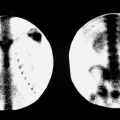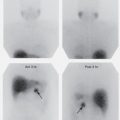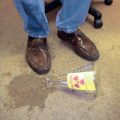Evaluation of patients and considerations prior to iodine-131 ( 131 I) are presented in Chapter 4 , and release instructions for iodine-131 therapy patients are also presented in Chapter 13 . The following are useful for hospitalized patients, and they can be adapted for home use if patients with more than 33 mCi (1.2 GBq) of 131 I are released.
- 1.
All patients in this category shall be in a private room with a toilet.
- 2.
The door must be posted with a radioactive materials sign, and a note must be posted on the door or in the patient’s chart explaining where and how long visitors may stay in the patient’s room.
- 3.
Visits by people younger than 18 years of age should be authorized only on a patient-by-patient basis with approval of the authorized user and after consultation with the radiation safety officer (RSO).
- 4.
A survey of the patient’s room and surrounding areas should be conducted as soon as practicable after administration of treatment dose. The results of daily surveys can be used to recalculate permitted staying times of various visitors. Film or thermoluminescent dosimeter badges should be worn by the nurses attending the patient.
- 5.
Patients containing 131 I shall be confined to their rooms except for special medical or nursing purposes approved by the nuclear medicine or radiation therapy departments and the RSO. The patient should remain in bed during visits.
- 6.
If possible, there should be no pregnant visitors or nurses attending the patient.
- 7.
Staff should wear disposable gloves when attending to the patient, discard them in a designated waste container located just inside the room, and wash their hands after leaving the room.
- 8.
Disposable plates and cups and other disposable items should be used, and after use they should be discarded in a specifically designated container.
- 9.
All items such as clothing, bed linens, and surgical dressings may be either surveyed before removal from the room or placed in a designated container and held for decay.
- 10.
Urine, feces, and vomitus from 131 I therapy patients may be disposed of by way of the sewer or stored for decay in the radioactive waste storage area. The method of disposal should be determined by the RSO.
- 11.
If the urine from 131 I patients is to be collected (not a Nuclear Regulatory Commission requirement), special containers should be provided by the RSO. The patient should be encouraged to collect his or her urine in the container. If the patient is bedridden, the urinal or bedpan should be flushed several times with hot soapy water after each use.
- 12.
The same toilet should be used by the patient at all times and should be flushed several times after each use. Visitors should not use the toilet in the patient’s room.
- 13.
Precautions should be taken to ensure that no urine or vomitus is spilled on the floor or bed. If any part of the patient’s room is suspected of being contaminated, the RSO should be notified.
- 14.
If a therapy patient needs emergency surgery or dies, the RSO and the nuclear medicine or radiation therapy departments should be notified immediately.
- 15.
After the patient is released from the room, the room should be surveyed and may not be reassigned until removable contamination is less than 2000 disintegrations/min per 100 cm 2 . Final survey of the room should include areas likely to have been contaminated, such as the toilet area, and items likely to have been touched by the patient, such as the telephone, handheld electronic controls, and doorknobs.
- 16.
The thyroid burden of each person who helped prepare or administer a liquid dosage of 131 I should be measured within 3 days after administration of the doses. The records should include each thyroid burden measurement, the date of measurement, the name of the person measured, and the initials of the person who made the measurements. These records must be maintained indefinitely.
Nursing Instructions
- 1.
Only the amount of time required for ordinary nursing care should be spent near the patient.
- 2.
Visitors should be limited to those 18 years of age or older, unless specified.
- 3.
The patient should remain in bed. All visitors should remain at least 2 meters from the patient.
- 4.
The patient should be confined to the room, except by special approval of the RSO.
- 5.
No pregnant nurse, visitor, or attendant should be permitted in the room, if possible. Attending personnel should wear disposable gloves.
- 6.
If a spill of urine or radioactive material is encountered, the RSO should be notified.
Stay updated, free articles. Join our Telegram channel

Full access? Get Clinical Tree






